
January 4, 2009
 CR Holiday Interview #12: Matt Fraction
CR Holiday Interview #12: Matt Fraction

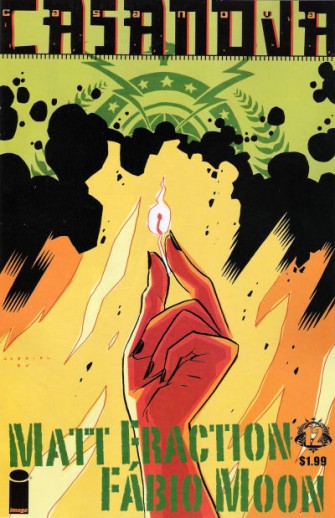
*****

It amuses me that
CR doesn't have a better 2008 photo of comics writer
Matt Fraction on file; we have multiples for the three years leading up to this one. Something blurry like this picture, taken during a panel at June's HeroesCon, actually might be more appropriate than a standard head shot given how quickly Fraction's career has progressed since our last talk in 2005. Coming off one of those all-time small-run gems with
Ed Brubaker on
Immortal Iron Fist, Fraction is now a solid player at a dominant
Marvel Comics, providing scripts for
Invincible Iron Man,
Uncanny X-Men and what seems like
whatever peripheral project into which they can shuttle The Mighty Thor. He just got off
a run of Punisher War Journal with which I'm dying to catch up, and it just goes to show you how productive a writer Fraction's become that I couldn't figure out a question to ask about an interesting project like that one without feeling I would have crossed the threshold into overstaying my welcome.
Fraction's best writing work remains his own creation,
Casanova, a super-spy story published through Image as much about the high-strung tenuousness of interpersonal relationships and the harm we do them as we stride though adulthood as it is about technology, double-crosses and the politics of will. He's at that beautiful place in a comics career where longtime readers rediscover the thrill of seeing these worlds through his fresh set of eyes, and newer readers have begun to see his emerging voice as specifically representative of an art form that's beginning to take a hold of them. Anchor dropped in Kansas City with his talented writer wife
Kelly Sue DeConnick and their young son, Fraction wears all of the good things happening to him extremely well. I am grateful that he found time for this interview during the holiday season, and I appreciate his honesty in engaging the content of each question no matter where that led him. Thanks, Matt. -- Tom Spurgeon
*****
TOM SPURGEON: Matt, are you at the point where you have to consciously or at least subconsciously manage your career? Not everyone does, of course, but I wondered if there's a point at which a writer in your position crosses the line from taking everything that comes or working totally from impulse control and starts to think about the projects as they come and what's manageable or desirable. What might that entail?
MATT FRACTION: It's all very gut-level/instinctual decision making. Is there a story here? Is there a story I want to tell? Do I like/am I intrigued/do I have anything to say with, or about, the characters? Will things explode/will people be kicked? Is this a fun way to spend my time? Is there -- forgive the metaphor -- the shock of attraction to a project? That's about as deep as it gets. Quite honestly, I'm not smart enough to be calculating, I'm not bold enough to play hypemeister, and I'm not patient enough to build a personality cult -- so whatever strategies in career management I have are pretty devoid of ulterior motive. I leap from one shock-of-the-new to the next; I try to obey whatever string there is inside me that certain ideas pluck, and dig in until I'm -- well, if not done, then at least satisfied. I've turned down very big things and very small things. Most times I'll claim time issues but the truth of the matter tends to be that I feel a degree of creative disconnect. I can pretty much find the time to do anything if I want to -- we had a baby and for the first few months of his life my output exploded. It's not work when you love it.
I have no impulse control. I am convinced, too, that this will all go away very soon. Touch everything you can.
SPURGEON: A kind of related question: at HeroesCon this year you were nice enough to be on a panel I was moderating about collaboration, which at the end turned into this surprisingly touchy roundtable on taking the comics plunge. When you were speaking about how you made the decision to pursue comics full time, I thought I detected a self-reflective curiosity on your part, an "Oh yeah, I did that." Could you repeat that story in broad strokes and how you feel about having made that decision now that you've had a chance to look back on it?
FRACTION: Uhm -- well, I had a very nice career set up for myself elsewhere, in a company I co-owned and co-built with some very good friends. It was a very creatively fulfilling gig but getting there was an exercise in abject terror. I was miserable in a lot of ways, but was (at least one of) the captain(s) of the ship. So anyway. In a fit of pique, and at a time of great personal revelation, I quit. I was, at that point, working on one book at Marvel and had just gotten half of another, and had
Casanova going but that doesn't bring in any revenue, and had a pregnant wife and mortgage that I'd assumed while living the aforementioned lucrative life of ship captain. And then we lost the baby and... and, and, and, and what now? So -- so, yeah, I dove into dark waters head first with the vague suspicion I'd be okay, that we'd -- my wife and I -- would be okay. I gave myself no other option but to make it work.
A thing about HeroesCon is -- I used to attend, as a fan; I used to work the show, as
Shelton's employee; now, attending as a guest on the other side of the table is... what, humbling, I guess? It's something. My head spins a little bit. So to be asked there, at the show, as a panelist, about my career, I suppose it just kind of knocked me for a momentary loop.
I don't know if I have it in me again -- it burned years off my life, Tom. Years. Both times. The anxiety was unreal, unbearable. I think that's what you heard, on that panel... that's two careers, two safe paths, obliterated by choice in the last ten years. That was the sound of me looking back over the past couple years and realizing what I was able to pull off after the fact. And shuddering a little bit.
SPURGEON: You finished a second volume of your Casanova
this year. I once heard Eddie Campbell and Rutu Modan talk about writing characters differently as they progressed with them than they might have at the beginning -- once you get to know the characters, you tend to write them differently. Is that true at all of your lead and the other characters in Casanova? Is there anything about that books that's revealed itself to you as you've finished up enough issues for a second book that you never would have suspected was there going in?
FRACTION: Oh, sure. And
Casanova's arc, or Casanova's arc, as the case may be, is about grown-up you having to cover the checks that young-you wrote. It was the first monthly I ever got to do, the first ongoing concern, and of the two arcs finished to date I think there's something of a document-of-growth happening both to the character and to me as I write it. At least that's what
I see when I look at it. I assume this will continue as
Casanova continues whether I want it to or not. I'm the book; the book is me. That said I always had a roadmap for where I want to take
Casanova, but sometimes things change in spite of that. Characters come up with their own ideas, or I just get smarter, or think otherwise of my guesstimated roadmap. So as I grow it grows, is what it's taken me all this time to say.
I never expected the thing to be so raw a document of my life and what I'm going through as I write it; for all the genre trappings and ridiculous stuff, the book is a kind of diary-in-aggregate, from the ridiculous to the sublime, surface to core, blippity blap, blah blah blah. I can't help it.
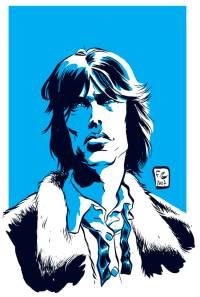 SPURGEON: One thing that I think that connects
SPURGEON: One thing that I think that connects Casanova
to your past works is this kind of meditation on family that comes out of this book and some of your others: the fluidity of those bonds, and the way that being a good person frequently means functioning well within those relationships. I apologize for this overly facile question, but as a husband and therefore a participant in a new family and now especially as a father, is there any way to speak in some way about how your perspective on family may have changed during the course of your career? Do you think the same sorts of relationships will be as interesting to you five years from now, say?
FRACTION: There's not a lot I understand about my process on
Casanova. I'm not sure I understand or even recognize all the ways being a father is changing me, other than the general sleeplessness and attendant lack of mental acuity (my friends have suffered through me telling and retelling the same stories and generally repeating myself for fifteen months now.). I'm saying I'm too
in it to know, but I can't imagine things not being changed and affected. And as you pointed out,
Casanova, being about family, surely will document wherever it is I find myself. I can't imagine those relationships not being as interesting; never say never, I suppose, but if I've got the makings of any sort of leitmotifs I'd bet that's one...
SPURGEON: I wanted to ask a couple of questions about how you process pop culture, Matt. I think of you as a writer aware of popular culture and various antecedents to where things stand now -- for example, I remember having a discussion with you about Joseph Mitchell, and you basically re-launched your site the other week by posting a link to a Google video version of Story of Ricky. I also think of you as someone who's cognizant of those elements in the work that you do: Casanova seems very much a certain kind of '60s spy literature even when it's not; ditto Iron Fist and martial arts stories. I guess my first question is this: how conscious are you of processing those pop culture influences or reference points, either working them in if they have an element you desire or working them out, say, if something you see in the work is too reminiscent of a specific past work by someone else? How do you find the balance between being influenced and not letting that influence dominate, and is it different as you do more work?
FRACTION: This is a big question; I'm going to try to answer as simply as possible because otherwise I'd talk about it until the end of the internet. I am extraordinarily conscious of processing those influences and reference points; I have tried very hard to dial back the conscious references, but I'm very unconscious of how I process them (a lot of times I don't see it until it's pointed out to me); I am constantly on the lookout for the subconscious rip-off and realize I don't catch 'em all.
I struggle to find the balance and think I fail more than I succeed. It's something I'm working on. I think it's what processing means, though. The generation I'm a part of -- look, I hear the guitar riff from "
The Ocean" and I don't think "The Ocean," I think "
She's Crafty." Sampling, right? I came up with sampling being a tool in the creation of pop culture, whether it's
Paul's Boutique or
Pulp Fiction. That metatextual layer, repurposing, scavenging and salvaging and paying homage and acknowledgment to the stuff that you love, to the stuff that's come before, and using that to comment on what you're doing... I've never really known a time when pop art didn't have that tool in its toolbox. Hell, even
Andy Warhol dripped for a while, right? You can reflect and honor and reject and homage everything and anything. I guess that... I have a hunch that maybe, as you're a young man or woman and you're building your body of work, in the early going, what else do you have to talk about
but yourself and the work you've consumed? Never progressing from being the guy that's seen every
Shaw Brothers movie is a bummer; being the guy that's seen every Shaw Brothers movie, lived a life and made real work and thought real thoughts and then makes
Crouching Tiger, Hidden Dragon is pretty amazing.
Have you read
Grant Morrison's Batman run? It's a pretty spectacular example of this -- using
Batman as frame of reference for Batman. The gag is that everything that's happened in the
Batman comic actually happened to Batman, right? And what would that do to a human mind? From the bleak
noir stuff to the bam-sock-pow stuff and everything in between. He's using the whole history of the character to comment on the character as the character endures it. And to comment on the comics mainstream, and on heroes, and all that great stuff. I mean, the first fight scene takes place in an art gallery during a Pop Art retrospective where these faux-Lichtenstein paintings of comics are commenting on the comic we're reading as we're reading it, for god's sake. And as the run went on, Morrison really used the entirety of the character's history as a frame of reference and context to comment on the character. Batman-as-
Batman-as-Pop-Culture-
in-toto. It's a mess, and a glorious one at that, and his reach might have exceeded his grasp for a couple reasons not exactly germane to this discussion, but it's been a pretty amazing piece, all the same. It's the
Cremaster of superhero comics.
What was the question? I liked
Cremaster. I like Batman. I like Grant Morrison.
SPURGEON: My second question is if you still pursue outside work and experiencing other kinds of art, comics or otherwise, and if that process has changed since the time in your early 20s when for a lot of people that kind of thing comes more naturally?
FRACTION: Do I still pursue outside work actively, meaning, do I still create things that aren't comic book scripts, or do I still pursue art as a consumer, passive or otherwise? I'm not sure which you mean. And do people really think that making art or, even weirder, that consuming art is somehow easier in their 20s?
It's been a couple years since I shot anything; short films and animation was my primary not-comics work venue. Part of that is due to the deadlines of monthly comics; part of that is the baby; part of that is, dude, movies are hard. I've started keeping a visual journal again, shot ideas, images from dreams, things I see, all that. I still try to consume as much as I can, but again, deadlines and a baby will cut down on movie watching and gallery crawling, as it were.
I don't find it any easier to make work now as I did then; I would surely never describe the process as one that comes naturally.
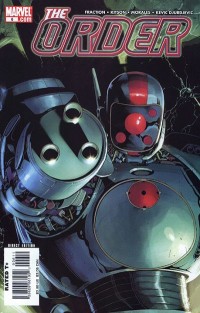 SPURGEON: What did you learn doing
SPURGEON: What did you learn doing The Order
that maybe you would not have learned if the title were still going?
FRACTION: Wow -- how Rumsfeldian? I'm not sure how to prove a predictive negative. I learned what it felt like to have to make difficult creative decisions in the wake of its financial failure, for lack of a better explanation. Which is embarrassing, I suppose, to not be able to singlehandedly (or co-singlehandedly ((ha!)), as it were, as that book was as much
Barry as me) launch a new superhero team book into the direct market and buck the last twenty years of sales tradition and create a new and lasting property. Is that what you mean? What did it feel like to not launch a successful book from Marvel Comics? It was a bummer. People might claim the market wants mid-level unique spins on the genre but, if that's true, they didn't want it from me, or at least, they didn't want THAT one. We worked hard and our seed found no purchase. I learned what that felt like. We tried to do a thing and it didn't work. Slowly zoom in on lone tear running down cheek; pan down to pile of un-bought, unread, and unloved issues of
The Order in a bonfire. Dissolve to the widows Fraction and Kitson, weeping over the pauper's grave their husbands share.
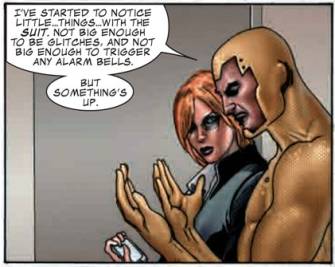 SPURGEON: Your Iron Man gig strikes me as a particularly interesting assignment because from a comics standpoint, despite Marvel's objections to saying so, the character was kind of damaged goods in a sense, and yet the movie was either out -- or forthcoming, actually, I think -- and provided at least a vote of confidence for one way the character might work. In addition, it's one of the older Marvel characters, it's about 25 years removed from its point of greatest connection with fans, and it had had at least two, maybe three major revamps in the last decade. How does one turn that cacophony of elements informing a character like that into something with which you can work? Do you pick and choose, do you ignore the past altogether, do you follow a gut feeling, do you focus more on the way your own story is constructed…? How did your Iron Man come together?
SPURGEON: Your Iron Man gig strikes me as a particularly interesting assignment because from a comics standpoint, despite Marvel's objections to saying so, the character was kind of damaged goods in a sense, and yet the movie was either out -- or forthcoming, actually, I think -- and provided at least a vote of confidence for one way the character might work. In addition, it's one of the older Marvel characters, it's about 25 years removed from its point of greatest connection with fans, and it had had at least two, maybe three major revamps in the last decade. How does one turn that cacophony of elements informing a character like that into something with which you can work? Do you pick and choose, do you ignore the past altogether, do you follow a gut feeling, do you focus more on the way your own story is constructed…? How did your Iron Man come together?
FRACTION: Clearly I'm in the tank for the character, so go ahead and disregard all that follows as the neurotic and self-important protestations of someone in the throws of denial, but --
-- I don't think
any character is "damaged goods." I reject the premise. Creators can be damaged goods, sure. But characters? No character is damaged goods in the hands of a writer with vision. It's fiction. You can do anything. Some people on the internet didn't like the way the character behaved in a story. That's not "damaged goods."
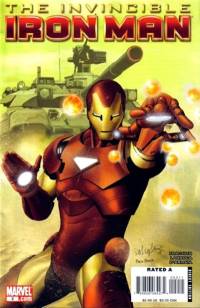
I got the book a year ago; literally, almost to the day. Marvel wanted a new
Iron Man book, a new ongoing #1, on the stands when the movie was released. I pitched for it in the room, at last year's winter Editorial Retreat, and got it right before the holiday. I had no special access to any information about the film; I had no idea what they were going to do; I just made a lot of lucky guesses based on what I read in
Variety. I wrote the book I wanted to read and hoped the movie would be one I'd want to see. So in terms of a "vote of confidence for one way the character might work"... I got lucky. I ignored the cacophony, basically. Continuity is the devil; consistency is the watchword. Accessibility balanced with respect for history, with the understanding that readability trumps all. It's all kind of gut-check stuff tempered by common sense. I don't think it's impossible to satisfy lifelong
Iron Man readers with people like my folks who had no idea who Iron Man was before the book and the movie.
The
Iron Man book I write came together by doing a lot of reading. I wanted it to be a science fiction book that took place tomorrow, or next week, rather than, y'know, innnnnnn ttthhhhheeeee ffffffffffuuuuuuuturrrrrrrrrrrrrre. I mean, even William Gibson is writing SF that takes place in the past, right? Also I'm not that smart, so I needed as little real science as possible. I read about cell phone penetration vs. land line penetration in the third world. I read about emergent terrorist states. I went to AA meetings and read the Big Book. I read about the evolution of 4G warfare. I read about biotech breakthroughs and cybernetic enhancements. I read old
Iron Man comics. I woolgathered and magpied notes together.
Then I ignored everything and wrote the
Iron Man book I wanted to read.
(I lost my mind reading about the siege of Mumbai.)
SPURGEON: One of the more interesting about the art in your Iron Man
is Salvador Larocca's visual references to celebrities… in fact, you've worked with a number of strong stylists. Is there any way that you as a writer will respond to or make choices based on stylistic strategies undertaken by an artist with whom you're working?
FRACTION: I can't stand that stuff, personally -- yanks me out of the story immediately. Not photo referencing, that's not what bugs me, but using celebrities just... it's as intrusive as someone standing over your shoulder reading the word balloons with funny voices. Bums me out.
I don't write
to that stuff, specifically, but I try very hard to write specifically for each of my collaborators, yes. Each book, each collaborator is different. I hate writing blind and, with very very few exceptions, I haven't had to very often. Again, it's a collaborative medium; it seems the least I can do is try to write as best I can
for my partners, play to their strengths, write the comic I'd want to see them draw.
SPURGEON: There are humorous elements to all of your books, and one of your earliest was an outright comedy... Has it been difficult at all to find a way to blend adventure comics, especially those books you do squarely in the US comics mainstream, with humor? Do you find that there's an element of certain comics readers wanting their chocolate over here and their peanut butter way over there, or do you feel they're more open to humor or varying approaches in general than conventional wisdom might hold? Will you ever do a flat-out humor book again?
FRACTION: Unfortunately, sometimes, no -- the jokes just happen, in spite of my best intentions. But then, life is funny. Mine is, anyway. Even at its most grim, someone makes a joke. The darker the better. Maybe I've just surrounded myself with funny unlucky people. I'm sure it annoys people; god forbid we find something amusing about Batman's hidden bottle of Anti-Crime Spray. The laughs just come, as much as tears or teeth-clenching or anything else. I don't ever set out to, like, write funny. Because that is
completely unfunny every time.
I dunno if I'll ever do a flat-out humor book again. Probably not. I liked my old, funny stuff better.
SPURGEON: I've read some of your X-Men
work... what if anything interests you about those characters in terms of thematic possibilities? That's supposedly the great metaphor comic and I wonder if you saw something specific in them that interested you, or where your enthusiasm in working on those comics lies, period.
FRACTION: Of course I saw something specific in them that interests me, but those're the wrong questions. All comics are great metaphor comics. All comics are absolutely drunk with thematic possibilities. You might as well ask me, what interests me about comics, period.
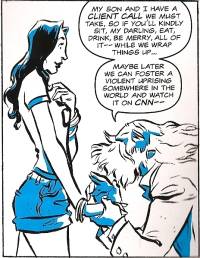 SPURGEON:
SPURGEON: Casanova
was serialized in a format that stressed small page counts and cheaper prices in order to facilitate an easier entry point for both creators and potential readers. Do you plan on return to that characters, and if so, in that format? Comics looks like it could be entertain into an era of format upheaval -- no one would be surprised if you were working on a the same kinds of things five years from now and no one would be surprised if you were working on 90 percent on-line serials, say. Where do you think we're heading, and how concerned are you about the potential vocational impact?
FRACTION: Yes;
Casanova will be back in the new year. No, not in that format. Nobody cared about that format -- or rather, the format didn't work as the value-add I was hoping. Lots of people that read the book liked the format, but the format itself didn't incentivize the book.
Let me talk about the practical side of it, then the creative side, if I may. Retailers largely didn't care; some even wrote me to tell me they resented I was occupying shelf space with a $2 book that they could have filled with a $5
IDW book. Retailers have referred to it as being "black and white," to my face, in spite of the fact that it's not; in spite of the fact that the second volume was shot through with pure Cyan to insure it never happen again, and yet happen again it did. All the... all the stuff I thought we could do, all the stuff that
Ba and Moon and I came up with to stand out, to be unique, to up our numbers, or our visibility, to make the book more accessible to retailers and readers alike, anything we did to be at least something a little different... it didn't help and in numerous cases, however anecdotal, actually hurt the book.
It's a safe bet we could sell at least as many copies at regular length, in color, for a buck and a half more, and actually not just break even but Ba and/or Moon could make something approaching a wage. Maybe it's the format; maybe the book's just never going to find an audience. I'm not ready to concede the second point so I'm focusing on the first.
I believe it's working just fine for
Warren and
Ben on
Fell. We're not them.
Creatively... I regret the backmatter. Profoundly. I wish I'd... I wish I realized that just because Warren and Ben were doing something like that for
Fell that I didn't have to do it for
Casanova. "Have to." Christ, what a good boy. Like there was an editorial mandate or something. Anyway I wish it was more comics instead of me bloviating endlessly. I come from art school and film school; that's the culture I cut my creative teeth in so I'm no stranger to talking about my work and where it came from and why but... y'know, me going on in front of a class for five minutes is a transitory thing in a room designed for that kind of thing, in front of an audience that's doing the exact same thing. Putting that garbage in print means its there forever. Anyway I'm done with that. When the book comes back it will be in a much more standard format.
I don't know where we're headed. I don't believe the market will tolerate too many deviations of form at the moment, in this economy. Maybe the very toppermost of the poppermost of creators can play around, from the toppermost of the poppermost of publishers. Maybe.
SPURGEON: Is comics a nice place to work?
FRACTION: Yeah, I like it a lot. I get to make up ridiculous stuff until all hours of the night and play with my baby and be with my wife whenever I like.
SPURGEON: What could it do to be a better place?
FRACTION: A union, standardized health care, and retirement programs to take care of the giants from whose shoulders we launch ourselves into flight after they've fallen from popular favor would all be a good start.
*****
* one of the beautiful Fabio Moon covers to the recently ended second-volume run on
Casanova
* hilariously blurry photo by Whit Spurgeon, I think
* Fabio Moon portrait of Casanova Quinn
* cover to one of the issues of the Matt Fraction/Barry Kitson collaboration,
The Order
* panel from
Invincible Iron Man
*
Invincible Iron Man cover
* panel from
Casanova
* [below] panel from
Casanova
*****
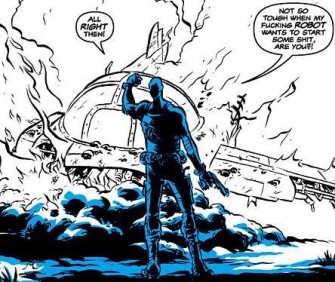
*****
*****
posted 12:00 am PST |
Permalink
Daily Blog Archives
November 2019
October 2019
September 2019
August 2019
July 2019
Full Archives


